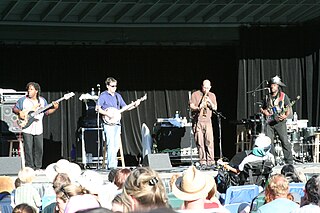
Béla Fleck and the Flecktones is an American band that combines jazz and bluegrass music. The band's name is a play on 1960s rock band Dick Dale and the Del-Tones.

Béla Anton Leoš Fleck is an American banjo player. An acclaimed virtuoso, he is an innovative and technically proficient pioneer and ambassador of the banjo, bringing the instrument from its bluegrass roots to jazz, classical, rock and various world music genres. He is best known for his work with the bands New Grass Revival and Béla Fleck and the Flecktones. Fleck has won 14 Grammy Awards and been nominated 33 times.

Edgar Meyer is an American bassist and composer. His styles include classical, bluegrass, newgrass, and jazz. He has won five Grammy Awards and been nominated seven times.

Charles Samuel Bush is an American mandolinist who is considered an originator of progressive bluegrass music. In 2020, he was inducted into the International Bluegrass Music Hall of Fame as a member of New Grass Revival.

Tony Furtado is an American singer-songwriter, banjoist, and guitarist.

The Telluride Sessions is an album recorded by five acoustic-music instrumentalists under the name Strength in Numbers and released in 1989 on MCA Records Nashville. The five members are: Sam Bush, Jerry Douglas, Béla Fleck, Mark O'Connor, and Edgar Meyer. The album is progressive bluegrass with jazz inflections, but also adds elements from classical music. O'Connor, Fleck, and Meyer further developed this genre in their compositions for orchestra and chamber music.

Live Art is the fifth album released by Béla Fleck and the Flecktones and their first non-studio album. It was recorded live at various concerts between 1992 and 1996 and features ten guest musicians.
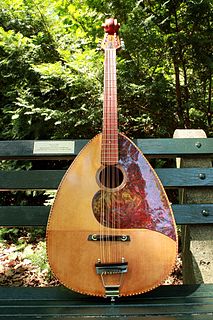
The mandocello is a plucked string instrument of the mandolin family. It is larger than the mandolin, and is the baritone instrument of the mandolin family. Its eight strings are in four paired courses, with the strings in each course tuned in unison. Overall tuning of the courses is in fifths like a mandolin, but beginning on bass C (C2). It can be described as being to the mandolin what the cello is to the violin.

Christopher Scott Thile is an American mandolinist, singer, songwriter, composer, and radio personality, best known for his work in the progressive acoustic trio Nickel Creek and the acoustic folk and progressive bluegrass quintet Punch Brothers. He is a 2012 MacArthur Fellow. In October 2016, he became the host of the radio variety show A Prairie Home Companion, which in December 2017 was renamed Live from Here.
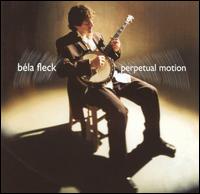
Perpetual Motion is an album of classical music released in 2001. The album is unusual in that none of the pieces featured on it are played on the instruments for which they were written. Arrangers Béla Fleck and Edgar Meyer won a Grammy in 2002 for their arrangement of Claude Debussy's "Doctor Gradus Ad Parnassum". The album also won a Grammy as Best Classical Crossover Album.
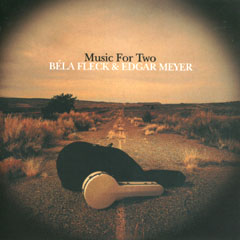
Music for Two is an album of duets by Edgar Meyer and Béla Fleck created and recorded while touring to support Perpetual Motion and released by Sony Classical in 2004. Most of the pieces are original compositions by Meyer and Fleck, working alone and together. They also perform four of their arrangements of music by J. S. Bach, an arrangement of a sonata by Henry Eccles, and piece by Miles Davis.
Strength In Numbers was a bluegrass supergroup formed in the late 1980s. The group featured Béla Fleck (banjo), Mark O'Connor, Sam Bush (mandolin), Jerry Douglas (dobro) and Edgar Meyer (bass). They released their only album, Telluride Sessions, in 1989. The group, minus Fleck, played on "Nothing but a Child" from Steve Earle's 1988 album, Copperhead Road under the name "Telluride".
Zigeunerweisen, Op. 20, is a musical composition for violin and orchestra written in 1878 by the Spanish composer Pablo de Sarasate. It was premiered the same year in Leipzig, Germany. It is based on themes of the Roma people, and in the last section the rhythms of the csárdás; this section uses a theme previously used in Franz Liszt's Hungarian Rhapsody No. 13, composed in 1847.

Jingle All the Way is a Christmas album and the thirteenth album overall by Béla Fleck and the Flecktones. Released in 2008 under Rounder, it marks the band's first record since their departure from Columbia. Jingle All the Way reached #1 on the Top Contemporary Jazz chart, the group's first album to do so since 1991. It also won the 2009 Grammy Award for Best Pop Instrumental Album.
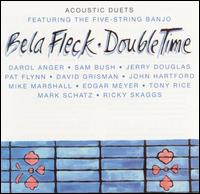
Double Time is an album by American banjoist Béla Fleck, released in 1984.

Tales From The Acoustic Planet is an album by American banjoist Béla Fleck. It is a jazzy album with roots in bluegrass, where Fleck is joined by bluegrass stars, as well as his jazz friends and Flecktones members. This is also his first solo album since 1988's Places.
Places is a compilation album by American banjoist Béla Fleck, recorded in 1988. It marks Fleck's last record with Rounder Records, subsequent label change to Warner Bros. Records and soon birth of the Flecktones, who would release their debut album in 1990.

Natural Bridge is an album by American banjoist Béla Fleck, released in 1982. Bela Fleck was a young bluegrass player whose work with such bands as Spectrum and the New Grass Revival pushed the envelope of bluegrass tradition and contributed to the development of the New Acoustic movement spearheaded by mandolinist David Grisman, guitarist Tony Rice, and others. Influenced by Bill Keith and Tony Trischka, he moved the banjo sound much further than anyone could imagine.

Fair Weather is album by American banjoist Alison Brown, released in 2000.

Dawg Duos is a collaborative bluegrass album by David Grisman and 12 different artists, released in 1999. Each of them performs a duo with Grisman on mandolin or mandola. The instruments are as diverse as drums, accordion, autoharp, besides banjo, guitar, string bass, and violin. . This album can be compared with similar effort by Béla Fleck, Double Time, where Grisman performs duo with Fleck on one of the tracks.

















